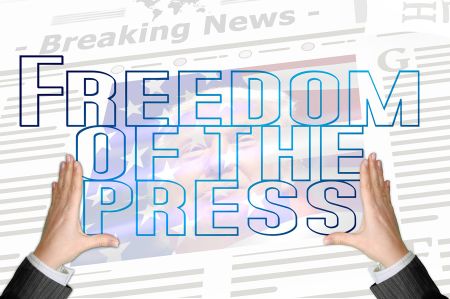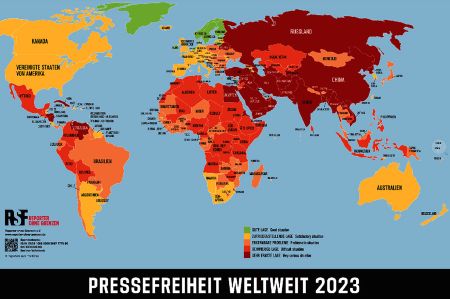Freedom of press remain a major problem
- Written by Portal Editor
Probably the most prominent member of the International Association of Book Publishers (IPA), the new chairman of the IPA Freedom to Publish Committee (IFTPC) Ola Wallin, has called on Turkey to finally release the journalists, writers and translators who were arrested after the Anti -Arrested under terror laws, still in custody.
Unacceptable conditions still prevail for journalists and editors in Turkey, because the country's attitude to freedom of expression is "worrying".
Wallin came here to meet well-known Turkish publishers Ragıp Zarakolu and İrfan Sancı. Both face a prison sentence of between six and ten years for publishing a translation of the French poet Guillaume Apollinaires (1880-1918). The case of the Turkish publisher İrfan Sancı, who now has to go back to court after being acquitted, is particularly in focus. The Court of Appeal in Ankara has overturned the earlier acquittals for the editor and his translator. The court found that the book The Heroic Deeds of Young Don Juan, first published in 1911, violated the obscenity paragraph. It contains descriptions of "lesbian, unnatural and sexual relationships performed with animals".
Then in the summer of 2013 the turnaround: you have to go back to court.
 In 2009, the publishing house Sel Yayincilik of the editor Sancı wanted to publish an erotic series. A year later he found himself in court. Initially, the court of first instance followed the Strasbourg arguments and the publisher Irfan Sanci and his translator Ismail Yerguz were acquitted. Then in the summer of 2013 the turnaround: you have to go back to court. Both now face prison sentences of up to ten years. The Turkish Publishers Association also protested violently against this decision. He called on the Turkish government to remove all barriers to freedom of publication. So far without success.
In 2009, the publishing house Sel Yayincilik of the editor Sancı wanted to publish an erotic series. A year later he found himself in court. Initially, the court of first instance followed the Strasbourg arguments and the publisher Irfan Sanci and his translator Ismail Yerguz were acquitted. Then in the summer of 2013 the turnaround: you have to go back to court. Both now face prison sentences of up to ten years. The Turkish Publishers Association also protested violently against this decision. He called on the Turkish government to remove all barriers to freedom of publication. So far without success.
Understandably, the International Association of Book Publishers (IPA) no longer wants to accept the precarious situation of writers in Turkey. The Swedish publisher calls on Turkey to finally get journalists, writers and translators out of prison:
“Writers, journalists, translators and publishers working in Turkey are bound by a range of laws and regulations, most notably the country's Anti-Terrorism Laws and the Turkish Penal Code, which purport to give the country its dignity and combat racial hatred, obscenity and defamation threatened.”
Many journalists and editors are currently in prison or threatened by law enforcement as a result of the abuse of these laws. Three other examples that stand for many here are Deniz Zarakolu, Ayse Berktay and Nedim Şener. They are all currently in detention or threatened with imprisonment for exercising their human rights.
The association demands their immediate release.
 "I'm not sure if I would be able to continue my work as a publisher under these conditions if I lived in Turkey," Wallin told Turkey's Hürriyet newspaper. "Something's wrong here. People are being targeted here for exercising their right to freedom of expression without resorting to violence. That's undemocratic. Turkey is a modern country and has made remarkable economic developments. But the obstacles being laid in the way of freedom of expression are worrying,” Wallin continued.
"I'm not sure if I would be able to continue my work as a publisher under these conditions if I lived in Turkey," Wallin told Turkey's Hürriyet newspaper. "Something's wrong here. People are being targeted here for exercising their right to freedom of expression without resorting to violence. That's undemocratic. Turkey is a modern country and has made remarkable economic developments. But the obstacles being laid in the way of freedom of expression are worrying,” Wallin continued.
According to the IPA, 66 journalists, writers and translators are currently behind bars. Most of them have been detained without any charges having been brought. The association demands their immediate release. Including those of Berktay and Zarakolu, who have been in prison for more than two years. Reporters Without Borders also currently describe Turkey as the "world's largest prison for journalists".
Josef Haslinger, Pen President on the Day of the Imprisoned Writer in the Westdeutsche Zeitung:
Mr. Haslinger, where are authors particularly oppressed?
Josef Haslinger: In 2013, the situation in Syria became unmanageable. However, China is still the front runner. Nobel Peace Prize laureate Liu Xiaobo is being held there, along with at least 40 named writers, journalists and bloggers, including Kunchok Tsephel Gopey Tsang, who is serving a 15-year sentence for the crime of running a Tibetan website.
Belarus and Turkey have the worst human rights status among European countries. In Belarus, the most important literary publishing house, Lohvinau, has been closed and this year's Peace Prize winner Svetlana Alexievich is not allowed to publish her books, which have been translated worldwide.
What about the freedom of Internet authors?
Haslinger: The problems of bloggers are increasing all over the world, especially again in China, Vietnam and the Arab countries. In Turkey, Fazil Say was convicted of insulting religion for tweeting literary texts.
How are authors suppressed?
Haslinger: Websites are hacked and protected with firewalls. The authors are attacked, interrogated, imprisoned. Their passports are taken away and they are put under house arrest – often their family members too. There are reports of torture from many countries, from North Korea, China, Vietnam and Turkey. And as is well known, even the CIA keeps coming up with new methods.
Please read as well:
Walser costume - explanations of the tradition in Mittelberg
